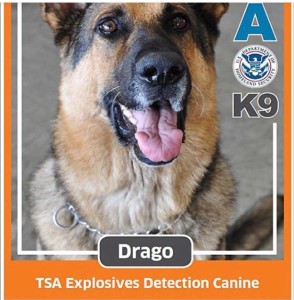Emma Silvers of KQED Arts writes in this totally apt piece that one of the great paradoxes of the Internet Age: Social media has allowed for an unprecedented level of intimacy between friends separated by thousands of miles, between celebrities and their fans, between brands and their millennial consumers.
No one’s Facebook, Twitter or Instagram account is an even remotely accurate representation of their lives, because the overall point of social media is to craft likability; you post things you’ve determined other people might want to see. (Whether or not you are old enough to instinctively understand this surely influenced your level of surprise around this recent, viral “story” about a teenage Instagram model telling it like it is.)
There’s a veritable traffic jam of interesting case studies at this intersection of intimacy and bullsh*t. But today I’d like to pay homage to one in particular: The undercelebrated world of government social media accounts.
No, I’m not talking about President Obama getting a personal Facebook account. Of course Obama got Facebook. No one cares. I’m talking here about what the conversation must have sounded like in the office the day the USDA Food Safety program decided it needed a social media presence through which to share tips for proper poultry preparation.
A brief spin through this Twitter feed shows you the USDA Food Safety Social Media Person making very earnest work of what Social Media People are supposed to do: He or she jumps on trending topics, name-checks celebrities and the pop culture events du jour, and gets in line with holiday-themed and otherwise seasonally appropriate content.
Underlying the patently insane tone of most of these tweets is this blanket assumption that every business, every organization that wants to be successful absolutely must have social media accounts. That’s where the kids are, after all — might as well meet ’em where they live and teach ’em a thing or two about proper meat temperatures while you’re at it!
 The question of whether anyone has actually been saved from foodborne illness via tweet is, on the other hand, surely up for debate. Is a guy who doesn’t know to wash his hands after handling raw chicken really a guy who’s following USDA Food Safety on Twitter? Is an irony-appreciating millennial who might not otherwise be open to messaging about listeria going to sit up and pay attention because of the hashtag #Sharknado3?
The question of whether anyone has actually been saved from foodborne illness via tweet is, on the other hand, surely up for debate. Is a guy who doesn’t know to wash his hands after handling raw chicken really a guy who’s following USDA Food Safety on Twitter? Is an irony-appreciating millennial who might not otherwise be open to messaging about listeria going to sit up and pay attention because of the hashtag #Sharknado3?
The official Instagram account of the TSA, meanwhile, takes a more detached stance. This account delivers to its 374,000 loyal followers a mostly objective window into the assorted grab-bag of concealed knives, guns and narcotics the governmental body confiscates daily from travelers at airports all over the country.
Also, portraits of cute drug-sniffing TSA dogs.
Sometimes the photos are accompanied by tips and information about which items, exactly, are kosher to carry onto an aircraft (hint: no knives, guns, or narcotics), but mostly this account seems to operate from a place of gleeful voyeurism: Someone thought they were gonna get that onto a plane?
Connecting with customers is a key aim of social media, and these posts do that, to be sure — but the wrench in these interactions is that federal agencies don’t have customers. We’re not choosing the USDA Food Safety regulations over some other available option; we don’t compare prices and decide to get searched by the TSA, specifically, when we fly. So why do they care if we like them?
Okay, so likability might be the wrong noun here — we could say their primary motive is to simply humanize an otherwise sterile, standardized and thoroughly regimented chunk of government, and to show that they are in fact performing a useful function; in the case of the TSA, especially, you’re talking about an organization with whom most of the American populace positively dreads interaction. Yes, they’re helping to keep us safe. They’re also basically the dentists of the government world — ones that can get you thrown in jail. (Related: The U.S. Border Patrol’s Twitter feed is similar, but methier.)
So: Is it working? Unlike brand loyalty, which can be measured by what products we actually purchase following a social media interaction, there’s pretty much no way to track whether John Doe is feeling more warmly toward his TSA agent during a full-body search at SFO than he did prior to following the agency on Instagram. And, again, it’s not exactly going to affect the TSA’s bottom line.
 What we’re left with, then, is a snapshot of a specific moment in our collective understanding of social media’s purpose as it evolves. Side by side with landmark social movements like Black Lives Matter — which arguably coalesced and gained steam predominantly in the online world, with an aim of affecting real change in the tangible one — we have brick-and-mortar agencies that perform self-evident functions feeling obvious pressure to contribute something, anything, to the jumble of self-promotion and online noise that is social media, regardless of the value. No matter if a Twitter feed makes sense for your organization: Does your organization even exist, if it doesn’t tweet? It’s a vignette that I think will become more telling with time, as the first generation that has never known a world without Twitter or Instagram comes of age, and as businesses (hopefully) learn to wield social media as a tool without embarrassing themselves(or us) anymore than they already have.
What we’re left with, then, is a snapshot of a specific moment in our collective understanding of social media’s purpose as it evolves. Side by side with landmark social movements like Black Lives Matter — which arguably coalesced and gained steam predominantly in the online world, with an aim of affecting real change in the tangible one — we have brick-and-mortar agencies that perform self-evident functions feeling obvious pressure to contribute something, anything, to the jumble of self-promotion and online noise that is social media, regardless of the value. No matter if a Twitter feed makes sense for your organization: Does your organization even exist, if it doesn’t tweet? It’s a vignette that I think will become more telling with time, as the first generation that has never known a world without Twitter or Instagram comes of age, and as businesses (hopefully) learn to wield social media as a tool without embarrassing themselves(or us) anymore than they already have.
In the meantime, if they’re going to post it, we’re going to enjoy it. And hey: once we surgically remove our palms from our faces, we might even learn something.
And now, the U.S. government’s definition of social media (check your brain at the door):
This policy discusses the use of social media at the Food and Drug Administration regarding communicating to the general public via third-party platforms. It explains roles and responsibilities, requirements regarding establishing an account or a presence within social media as well as considerations to keep in mind when developing social media strategy and plans as a result of this policy.
Definition
Social media are web or mobile based third-party platforms that facilitate interaction and engagement among individuals in a network or virtual community. Social media offers a participatory environment and includes user-generated content such as videos, photos, videos, microblogs, blogs, and wikis.
Scope and Applicability
Federal agencies utilize social media platforms to engage with the public and to extend the reach of messages beyond traditional email notifications and websites. It is vital that a policy be created and implemented to ensure the Agency is appropriately represented in this space. The FDA encourages the use of social media technologies to enhance communication, collaboration, and information exchange in support of FDA’s mission to protect and promote public health. This policy applies to FDA employees, contractors, and other personnel acting in an official capacity when using social media to communicate with the public regarding FDA-related matters:
Using accounts that the FDA maintains on third-party platforms (e.g., Facebook, Twitter) or,
In forums or blogs where FDA does not have an official presence (e.g. replying to comments in a blog post where FDA was a guest blogger)
(For discussion on the personal use of social media, please see “Personal Use of Social Media by FDA Employees and Contractors” on page 4). FDA-related matters are topics or issues that relate to (1) data or information only available to the social-media user through his or her employment at FDA, (2) products within FDA’s jurisdiction, (3) analyses of FDA programs, policies, regulations, actions or initiatives, or (4) positions or opinions that could reasonably be perceived to reflect FDA’s view on issues within its jurisdiction. This policy does not supersede or replace existing legal obligations in effect. Roles and Responsibilities The Office of External Affairs (OEA) Web and Digital Media Staff and Office of Information Management and Technology (OIMT) are jointly responsible for ensuring that the FDA’s use of social media complies with Federal laws, policies, and best practices. Office of External Affairs:
Develops the overall communications strategy and priorities for the Agency.
OEA Web & Digital Media Staff (OEA Web):
Develops policy and procedures for social media use in consultation with OIMT.
Develops the social media strategy for OEA.
Provides oversight for all social media activities in the Agency.
Reviews/authorizes all social media channel/account requests for the Agency. Authorization is based on the request meeting Federal/FDA requirements and providing a social media strategy and social media plan.
Reviews all Agency procurements and contracts, including Terms of Service (TOS) agreements, related to social media tools and services to ensure necessity and reduce duplication.
Coordinates and manages the Agency’s primary social media channels (currently Facebook, Flickr, YouTube, Twitter account @US_FDA, and Pinterest).
Leads the monthly meeting of the FDA Social Media Working Group.
Serves as the Agency liaison for social media to the Health and Human Services (HHS) Digital Communications Division and GSA Social Media Community of Practice.
Office of Information Management and Technology:
Applies the requirements of this policy in its functions of providing appropriate Agency-wide web technology services and security, including technical assistance, to program offices.
Centers/Offices:
Prior to initiating social media accounts or procurement actions and contracts, Centers/Offices meet with OEA Web.
Develops the social media strategy for the Center/Office and ensures that it aligns with Agency priorities, their office or center communications strategy, and is coordinated with OEA Web. The strategy should include why social media is being used to meet the stated goals. The social media strategy must be submitted to OEA Web for review.
Develops social media plan in order to most effectively implement and manage the Center/Office’s social media presence including best practices, guidelines for consistency, how these mechanisms will support the goals outlined in the social media strategy.
The social media plan must be submitted to OEA Web for review.
Completes a privacy impact assessment and operates in compliance with HHS and the FDA’s social media policies.
Coordinates with and contributes content to OEA Web for posting on the FDA’s Agency-wide social media channels (Facebook, Flickr, YouTube, @US_FDA, Pinterest).
Assists with the dissemination of information on the FDA’s social media policies, guidelines, and best practices within the Center/Office.
Follows approved procedures for collecting and managing records associated with any social media accounts owned by the Center/Office.
Office of the Chief Counsel (OCC):
Provides legal advice relating to the web and social media.
Office of Operations, Division of Ethics and Integrity:
Oversees ethics requirements for FDA employees, including requirements pertaining to the use of social media.
Office of Information Management (OIM), Records Management Staff:
Oversees records management requirements for the FDA, including requirements pertaining to web records.
Personal Use of Social Media by FDA Employees and Contractors
FDA recognizes the right of employees to express their personal views via social media and encourages employees to use social media to share information that may benefit the public health, consistent with the following.
Principles, guidelines, and standards of conduct that apply to FDA employees in their official duties may apply to employee participation in social media, even in their personal capacity. For example, employees are bound by the Standards of Ethical Conduct for Employees of the Executive Branch, the conflict of interest statutes, the Hatch Act, 5 U.S.C. §§7321-7326,1 and the FDA Policy on Use of Government Electronic Equipment and Systems, FDA SMG 3140.1.2 Moreover, employees must understand that non-public information (e.g., personal privacy information, trade secrets, confidential commercial information, or information subject to government privilege) may not be conveyed via social media unless its release to the public is lawful and has been authorized by FDA management in accordance with the law.
To use social media in his or her personal capacity, an employee does not need to obtain permission or approval from supervisors or agency management and does not need to obtain outside activity ethics clearance pursuant to the HHS Supplemental Standards of Ethical Conduct at 5 CFR § 5501.106(d).
However, the ethical restrictions on receipt of compensation, disclosure of nonpublic information, and improper use of government title or official authority still apply to this activity.
And so it goes.

